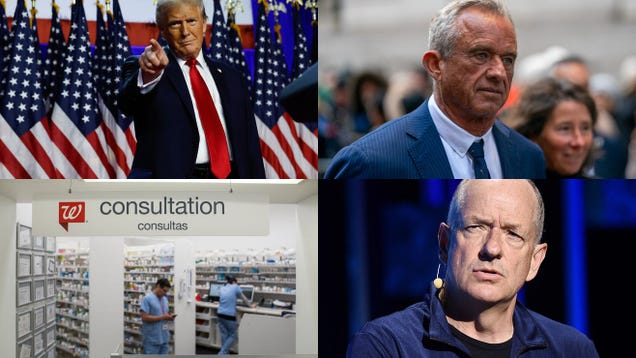Unpacking Promises and Rejections: A Dive into Today’s Business Headlines
In an ever-evolving business landscape, recent developments have sparked conversations across various sectors. From significant financial pledges to controversial health discussions and corporate stances on cryptocurrency, the headlines paint a vivid picture of current trends and sentiments. This article delves into three key stories: Trump’s ambitious $1 billion pledge, Robert F. Kennedy Jr.’s commentary on Ozempic, and Microsoft’s unexpected position on Bitcoin. Each of these narratives not only reflects individual events but also offers insights into broader implications for the business world.
Trump’s $1 Billion Pledge: Ambition or Illusion?
Former President Donald Trump has made headlines once again, this time with a bold announcement of a $1 billion pledge aimed at supporting various business initiatives. While the specifics of this pledge remain somewhat nebulous, it has raised eyebrows among analysts and business leaders alike. The question on many minds is whether this ambitious promise is a genuine commitment or merely a strategic move to bolster his political aspirations.
Supporters of Trump herald this pledge as a potential catalyst for economic growth, particularly in sectors that have been historically overlooked. They argue that such a financial commitment could provide much-needed capital to small businesses and startups, fostering innovation and job creation. On the other hand, critics point out that Trump’s track record on similar promises has been inconsistent, raising doubts about the feasibility and sincerity of this latest endeavor.
Potential Impacts on the Business Landscape
- Small Business Growth: If executed effectively, the pledge could channel funds into small businesses, potentially revitalizing local economies.
- Political Ramifications: This move may be seen as an effort to strengthen Trump’s political base as he prepares for another presidential run.
- Public Skepticism: Many are wary of such grand promises, reminiscent of previous political pledges that failed to materialize.
The real test will be whether Trump can translate this pledge into actionable plans that deliver tangible benefits to the economy. As stakeholders await further details, the business community is left to ponder the implications of such a high-profile commitment.
RFK Jr.’s Ozempic Controversy: Health and Business Intersection
In a surprising turn, Robert F. Kennedy Jr. has stirred discussions around the diabetes medication Ozempic, suggesting it may lead to dangerous health trends. His comments have ignited a debate not only about the pharmaceutical industry but also about the ethics of medication marketing and public health messaging.
Ozempic, primarily used for Type 2 diabetes management, has gained attention for its weight-loss effects, leading to off-label use among those seeking quick weight loss solutions. Kennedy’s warnings about the potential misuse of the drug highlight a critical intersection between health and business. Pharmaceutical companies, while promoting medications for legitimate medical uses, may unintentionally contribute to a culture that prioritizes quick fixes over sustainable health practices.
The Broader Implications of Ozempic’s Popularity
- Market Trends: The surge in demand for Ozempic has led to increased sales for manufacturers, highlighting a lucrative market for diabetes-related medications.
- Public Health Concerns: The misuse of such medications can lead to broader health crises, prompting calls for stricter regulations on pharmaceutical advertising.
- Ethical Responsibilities: Companies must navigate the fine line between promoting their products and ensuring they are used appropriately for the intended medical conditions.
Kennedy’s remarks bring to light the responsibility that pharmaceutical companies hold, not only in the development of drugs but also in their marketing strategies. The potential for misuse of medications like Ozempic underscores the need for a more cautious approach to drug promotion, particularly in a society increasingly focused on rapid results.
Microsoft’s Surprising Stance Against Bitcoin
In another noteworthy development, Microsoft has taken a firm stance against Bitcoin, a decision that has caught many in the technology and financial sectors off guard. This move reflects growing concerns about the sustainability and ethical implications of cryptocurrency, particularly in light of its environmental impact and association with illicit activities.
Microsoft’s position is part of a broader trend among tech giants reevaluating their engagement with cryptocurrency. While some companies have embraced digital currencies and blockchain technology, others, like Microsoft, are advocating for a more cautious approach.
The Rationale Behind Microsoft’s Decision
- Environmental Concerns: The significant energy consumption associated with Bitcoin mining has raised alarms about its environmental sustainability.
- Regulatory Pressures: Increasing scrutiny from government regulators regarding cryptocurrencies may have prompted Microsoft to distance itself from Bitcoin.
- Focus on Innovation: Microsoft appears to be directing its efforts towards developing innovative solutions that align with its corporate values and sustainability goals.
This decision could influence other companies’ attitudes towards cryptocurrencies, particularly as public sentiment shifts in response to environmental and ethical concerns. Microsoft’s stance signals a potential pivot in the tech industry, where the allure of cryptocurrencies must be weighed against broader responsibilities to society and the planet.
As we unpack the latest developments surrounding Trump’s pledge, RFK Jr.’s comments on Ozempic, and Microsoft’s stance on Bitcoin, it becomes evident that today’s business environment is marked by complexity and interconnectivity. Each story reflects unique challenges and opportunities that stakeholders must navigate.
Business leaders, policymakers, and consumers alike must remain vigilant and informed as these narratives unfold. Whether it’s evaluating the implications of a political pledge, considering the health impacts of popular medications, or reassessing corporate strategies in the face of cryptocurrency challenges, the decisions made today will undoubtedly shape the business landscape of tomorrow. As we look to the future, it’s clear that the intersection of health, politics, and technology will continue to play a pivotal role in shaping our economy and society.
See more Business Focus Insider Team

